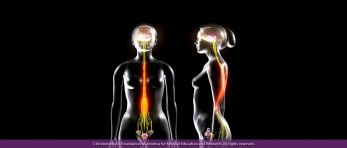What are the most common symptoms of endometriosis?
There are many symptoms of endometriosis, but not everyone will experience all, most, or even any of the symptoms. The disease can go undiagnosed for years and only present itself once the symptoms become severe.
-
Abnormal periods [including Periods with heavy bleeding (menorrhagia) and prolonged periods]:
A typical period will last 3 to 5 days. While it is considered normal to have a period lasting as long as 7 days, individuals with endometriosis can have periods longer than 7 days. In addition, periods with heavy bleeding will mean that tampons or pads usually need to be changed as often as every 1-2 hours.
-
Painful periods [Painful menstrual cramps (dysmenorrhea)]:
Pain can last for more than one day and even continue after the period is over. Most commonly, pain can be felt in the lower abdomen, pelvis or lower back. The pain may not be easily relieved with non-steroidal anti-inflammatory drugs (NSAIDs).
-
Painful sex (dyspareunia)
This may be a symptom of endometriosis that involves deeper tissues of the vagina and pelvic walls. While painful sex can also lead to relationship and body issues, patients can also start to become anxious and even fearful of having sex.
-
Bowel and urinary disorders
Disorders can include diarrhea, constipation, painful urination, bowel movements, blood in urine, and frequent urge to urinate. Individuals can also feel nausea, vomiting, bloating, and gassiness.
-
Neuropathy
Endometriosis can often implant in pelvic tissue underlying the nerves that lead to the legs. In these cases, it is common for patients to experience nerve pain in their lower extremities.
-
Infertility
As scar tissue and adhesions build up, it decreases the chances of fertilization occurring. The longer these lesions or related issues go untreated, the higher the risk of infertility. Studies have shown that endometriosis is linked to 1/3 of infertility cases, can prevent the release of eggs, and decrease the quality and number of eggs.
-
Fatigue and Personality Changes
Due to the chronic pain caused by endometriosis, many individuals find themselves feeling “different.” Patients can feel fatigued not only due to the pain but also due to the many years of stress searching for the proper diagnosis and treatment.
What should you do if you have symptoms of endometriosis?
If you think you may have endometriosis or have symptoms of endometriosis, finding an endometriosis specialist is crucial to getting a proper diagnosis and treatment for the disease. Begin by reviewing your symptoms with your OB/GYN, or another trusted medical professional, so they can assist you with recommendations, referrals, and follow-up care. Seek a second opinion if you do not receive the care you deserve. To learn more about choosing a doctor, visit this page.
References:
- Endometriosis and subfertility: is the relationship resolved? Thomas M D'Hooghe, Sophie Debrock, Joseph A Hill, Christel Meuleman
- Dynamics of nitric oxide, altered follicular microenvironment, and oocyte quality in women with endometriosis, Pravin T Goud, Anuradha P Goud, Narendra Joshi, Elizabeth Puscheck, Michael P Diamond, Husam M Abu-Soud
- Endometriosis, Serdar E. Bulun, M.D.
- Assessing research gaps and unmet needs in endometriosis, Sawsan As-Sanie, Rebecca Black, Linda C Giudice, Tanika Gray Valbrun, Jhumka Gupta, Brittany Jones, Marc R Laufer, Alexandra T Milspaw, Stacey A Missmer, Abby Norman, Robert N Taylor, Kedra Wallace, Zev Williams, Paul J Yong, Rebecca A Nebel
- What are the symptoms of endometriosis?, Tamer Seckin, MD








